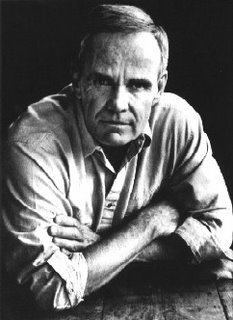 I have been having a rather Western week-end. I am reading Cormac McCarthy's contemporary Western, No Country For Old Men, recently published - and have also just seen Brokeback Mountain, the wildly-acclaimed cowboy-love story, starring Jake Gyllenhaal and Heath Ledger, and written by Larry McMurtry, one of the great Western writers of the 20th century.
I have been having a rather Western week-end. I am reading Cormac McCarthy's contemporary Western, No Country For Old Men, recently published - and have also just seen Brokeback Mountain, the wildly-acclaimed cowboy-love story, starring Jake Gyllenhaal and Heath Ledger, and written by Larry McMurtry, one of the great Western writers of the 20th century.I'll say little about Brokeback, except it is an account of love deferred - a sort of Of Human Bondage without the waitress - and at times is both either deeply humane and touching, or moving; it is rarely explicit, or even erotic, but the pastoral lovemaking and the young men in their outdoors apparel are full of youth and splendour.
I find the idea that it is a tragedy for star-crossed lovers to only manage to meet, several times a year, for 20 years, rather hard to swallow - so many love affairs are quashed far earlier than that.
The film is best when it evokes a sort of subtextual horror which is American mainstream capitalist society - the viewer feels that these souls are lost in a machine that has no time for lovers, much in the way of 1984. The disgust at the everyday and the working life of the city and town, and the institutions, such as marriage, and television, that underpin such drudgery, that director Ang Lee expresses, is palpable.
On the other hand, the image and idea of the free man - the cowboy - is dutifully and lovingly traced - one could almost say such a trope is unquestionably expressed - and therefore this is hardly a revisionist film at all in this sense (notwithstanding the homosexuality which will trouble some - many in my viewing left the cinema, sadly). Many of the great American ideas are burnished, if anything, especially the right for an individual to follow their own bliss.
McMurtry, who wrote that great classic from about 35 years ago, The Last Picture Show, has returned to his territory of young lovers in pickup trucks and dusty cars, honky tonk bars, sad lives in trailer homes, and very small towns, and he captures this world well; it is good to see Randy Quaid, a veteran of that masterpiece, return here, in a cameo. The T.S. Review gives the film Three Quartets.
I'll save my review of McCarthy for when I am finished the book. Suffice it to say, the novel is in extreme contrast to the film mentioned above. In this world (the writer is a Catholic) the unredeemed world is a flood plain of sin, and extreme violence (no sex so far) and good men line up against evil - it is almost Manichean in its fighting terms. The style, and fury, seem a bizarre mix of Faulkner, Jim Thompson, Chandler, and at times, sadly, Ludlum. It is, however, an extremely gripping yarn, as they say.
Link to his fan site below:
http://www.cormacmccarthy.com/Biography.htm
Comments